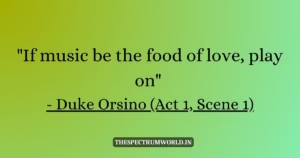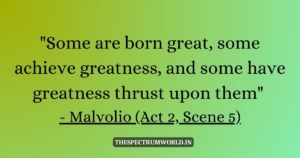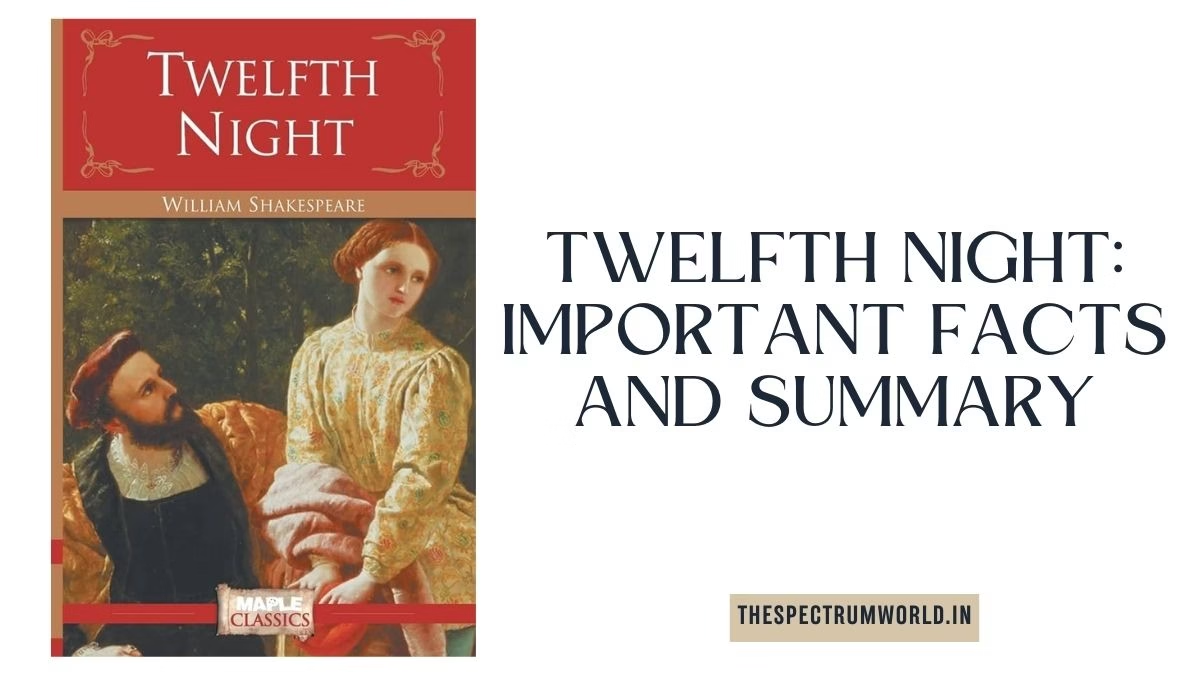Twelfth Night: Important Facts and Summary
William Shakespeare’s Twelfth Night is a timeless comedy that explores the complexities of love, identity, and deception. Written around 1601-1602, the play is a masterpiece of Shakespearean drama, featuring a rich cast of characters, witty dialogue, and a complex plot.
The play revolves around Viola, a young woman who disguises herself as a man, Cesario, after being shipwrecked in Illyria. Viola falls in love with Duke Orsino, who is himself in love with Countess Olivia. However, Olivia falls in love with Cesario (Viola in disguise), leading to a series of misunderstandings and comedic situations.
Table of Contents

Sources of Twelfth Night:
- Apuleius’s The Golden Ass: A Roman novel that features a character who disguises themselves as a member of the opposite sex.
- Italian commedia dell’arte: A theatrical tradition that influenced Shakespeare’s use of stock characters and comedic situations.
- Plautus’s comedies: Roman comedies that feature mistaken identities, disguises, and witty dialogue.
Act-wise Summary of Twelfth Night:
Act 1
- The play opens with Duke Orsino’s declaration of love for Countess Olivia.
- Viola, a young woman, is shipwrecked in Illyria and disguises herself as a man, Cesario, to serve Duke Orsino.
- Viola falls in love with Duke Orsino, but he sends her to woo Olivia on his behalf.
Act 2
- Cesario (Viola) meets Olivia and tries to woo her on behalf of Duke Orsino, but Olivia falls in love with Cesario instead.
- Two comedic characters, Sir Toby Belch and Sir Andrew Aguecheek, are introduced, and their antics provide much of the play’s humor.
- Malvolio, Olivia’s steward, is often the target of ridicule and satire.
Act 3
- Cesario (Viola) continues to woo Olivia on behalf of Duke Orsino, but Olivia’s affection for Cesario grows stronger.
- Sir Toby and Sir Andrew’s pranks on Malvolio lead to comedic misunderstandings.
- Olivia’s household becomes increasingly chaotic as the characters’ relationships and identities become more complex.
Act 4
- Malvolio is tricked into believing that Olivia loves him, leading to a series of comedic misunderstandings.
- Viola’s disguise as Cesario becomes increasingly complicated, and she struggles with her love for Duke Orsino.
- The play’s themes of love, identity, and deception are further explored.
Act 5
- The play’s climax features a series of revelations, including Viola’s true identity and Olivia’s love for Cesario (Viola).
- Duke Orsino realizes his love for Viola, and the play concludes with a sense of resolution and new beginnings.
- The characters’ relationships and identities are finally clarified, and the play ends on a hopeful note.

Themes in Twelfth Night:
- Love and desire: The play explores the complexities of love, including unrequited love, love triangles, and the blurred lines between love and lust.
- Identity and deception: Viola’s disguise as Cesario raises questions about identity, self-presentation, and the social constructs of gender.
- Comedy and satire: The play features a range of comedic characters, including Sir Toby Belch, Sir Andrew Aguecheek, and Malvolio, who are often the targets of Shakespeare’s satire.
- Social class and status: The play comments on the social hierarchies of Shakespeare’s time, particularly the relationships between masters and servants.
Characters in Twelfth Night:
- Viola/Cesario: The protagonist, a young woman who disguises herself as a man to serve Duke Orsino.
- Duke Orsino: A lovesick duke who is infatuated with Countess Olivia.
- Countess Olivia: A wealthy and independent noblewoman who becomes the object of desire for multiple characters.
- Sir Toby Belch: Olivia’s uncle, a comedic character known for his wit and humor.
- Malvolio: Olivia’s steward, who is often the target of ridicule and satire.
- Sir Andrew Aguecheek: A foolish knight who is in love with Olivia and provides comedic relief.
- Feste: A jester who serves Olivia and provides commentary on the play’s themes and characters.

Quotes from Twelfth Night:
- “If music be the food of love, play on” – Duke Orsino (Act 1, Scene 1)
- “Some are born great, some achieve greatness, and some have greatness thrust upon them” – Malvolio (Act 2, Scene 5)
- “How poor are they that have not patience! What wound did ever heal but by degrees?” – Viola (Act 2, Scene 1)
- “Be not afraid of greatness: some are born great, some achieve greatness, and some have greatness thrust upon ’em” – Malvolio (Act 2, Scene 5)
- “Journeys end in lovers meeting” – Feste (Act 2, Scene 3)
Twelfth Night is one of Shakespeare’s most beloved comedies, known for its witty dialogue, complex characters, and exploration of themes that remain relevant today. The play has been adapted countless times, influencing literature, film, and theater.

Conclusion of Twelfth Night:
Twelfth Night is a masterpiece of Shakespearean comedy, featuring a rich cast of characters, complex themes, and witty dialogue. The play’s exploration of love, identity, and deception continues to resonate with audiences today, making it a timeless classic of English literature.
Read more: The Merchant of Venice: Important Facts







One thought on “Twelfth Night: Important Facts and Summary”